Betta fish, often known as Siamese fighting fish, are one of the most popular freshwater fish in the aquarium hobby. Their vibrant colors and dynamic personalities make them a favorite among fish enthusiasts.
But to truly appreciate these magnificent creatures, it’s essential to understand their natural diet. Knowing what Betta fish eat in the wild helps us create a more enriching and healthier environment for them in captivity.
Natural Habitat of Betta Fish
Betta fish are native to the shallow waters of Southeast Asia, primarily found in Thailand, Cambodia, Laos, and Vietnam. These areas are characterized by rice paddies, slow-moving streams, and shallow ponds. The water in these habitats is often warm, slightly acidic, and densely vegetated, providing an ideal environment for Betta fish to thrive.
The natural surroundings play a significant role in shaping the diet of Betta fish. The abundance of vegetation, coupled with the warm climate, creates a haven for various insects and small organisms, which become the primary food sources for Betta fish. Understanding the natural habitat is crucial for replicating their diet in captivity.
Diet Composition in the Wild
In the wild, Betta fish have access to a diverse range of food sources. Their diet is carnivorous, primarily consisting of insects, small invertebrates, and zooplankton. Unlike in captivity, where Betta fish are often fed pellets and flakes, their diet in the wild is varied and rich in protein.
The difference between a wild and captive diet can significantly impact the health and vitality of Betta fish. While pellets and flakes are convenient and nutritionally balanced, they do not fully replicate the diversity and nutritional profile of a wild diet.
Types of Food Betta Fish Eat in the Wild
Insects and Larvae
One of the primary food sources for Betta fish in the wild is insects and their larvae. Mosquito larvae, in particular, are a favorite among Betta fish. These larvae are abundant in stagnant water, making them an easily accessible food source. Betta fish are known for their agility and precision in capturing these tiny creatures, which provide a rich source of protein and essential nutrients.
Zooplankton
Zooplankton, which includes tiny crustaceans and other microscopic organisms, also forms a crucial part of the Betta fish diet. These tiny organisms are abundant in the wild and provide essential nutrients that support the growth and health of Betta fish. The small size of zooplankton makes it an ideal food source for young Betta fish, ensuring they get the nutrients they need to grow strong and healthy.
Crustaceans
In addition to insects and zooplankton, Betta fish also consume small crustaceans such as copepods and amphipods. These crustaceans are rich in protein and other vital nutrients, making them an essential part of the Betta fish diet. The hard exoskeletons of these crustaceans also provide a source of roughage, which aids in digestion.
Worms and Other Small Invertebrates
Worms and other small invertebrates like nematodes and small snails are also part of the natural diet of Betta fish. These invertebrates are often found in the muddy substrate of their natural habitat, providing Betta fish with an additional source of nutrients. The varied diet helps Betta fish meet their nutritional needs, ensuring they remain healthy and vibrant.
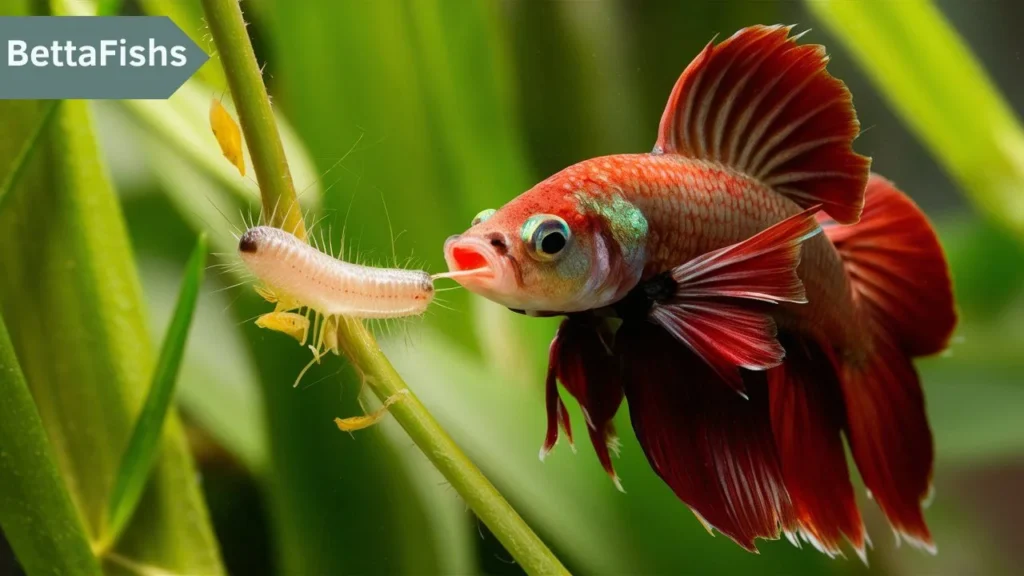
How Betta Fish Hunt in the Wild
Betta fish are skilled hunters, using their sharp eyesight and quick reflexes to capture prey. In the wild, they often lurk among the vegetation, waiting for the perfect moment to strike. Their ability to remain still and blend in with their surroundings gives them an advantage when hunting. Betta fish are also known for their ability to jump out of the water to catch flying insects, a skill that showcases their adaptability and resourcefulness.
Nutritional Needs of Wild Betta Fish
The diet of wild Betta fish is rich in protein, which is essential for their growth and overall health. The insects, zooplankton, and small invertebrates they consume provide a balanced mix of proteins, fats, and essential vitamins and minerals. This natural diet helps Betta fish maintain their vibrant colors, strong immune system, and energetic behavior.
Comparing this to the diet of captive Betta fish, it becomes evident that replicating the natural diet is challenging. While commercially available Betta fish food is formulated to meet their nutritional needs, it often lacks the variety and richness of their natural diet.
Impact of Seasonal Changes on Diet
The availability of food sources in the wild varies with the seasons. During the rainy season, the abundance of water leads to an increase in insect larvae and other small organisms, providing Betta fish with a plentiful food supply. However, during the dry season, food becomes scarce, and Betta fish must adapt by hunting more actively or consuming different types of prey.
These seasonal changes play a crucial role in shaping the diet and behavior of Betta fish. In captivity, it is essential to mimic these seasonal variations by providing a varied diet that changes over time, ensuring Betta fish receive all the nutrients they need.
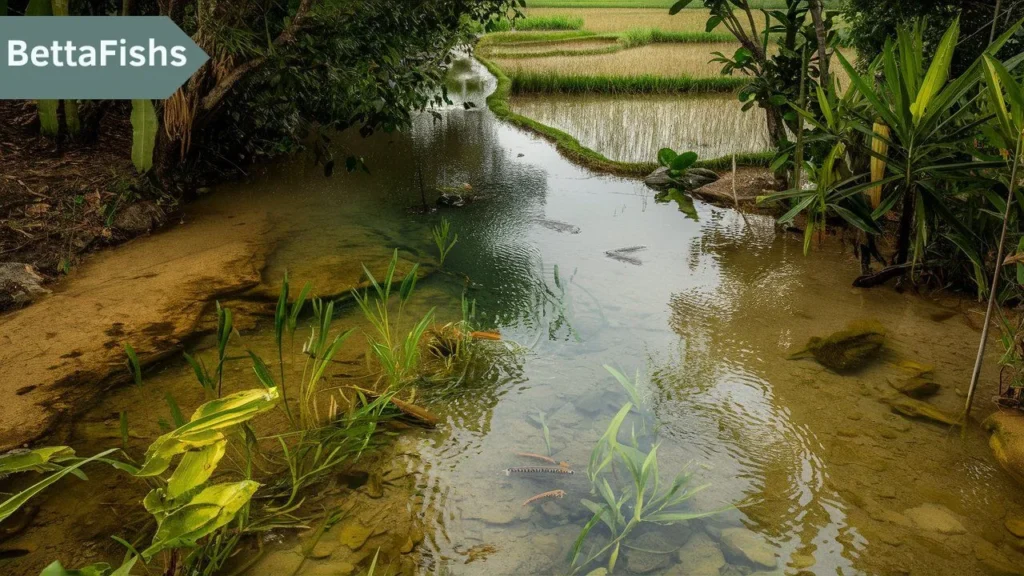
Differences Between Wild and Captive Diets
One of the main challenges in keeping Betta fish in captivity is replicating their natural diet. In the wild, Betta fish have access to a diverse range of food sources, while in captivity, their diet is often limited to pellets, flakes, and occasional live or frozen foods.
This difference can lead to nutritional deficiencies if not carefully managed. Betta fish owners must ensure that their pets receive a balanced diet that includes a variety of protein sources, such as live or frozen insects, worms, and crustaceans, to mimic their natural diet.
Health Benefits of a Natural Diet
Feeding Betta fish a diet that closely resembles their natural diet offers several health benefits. A varied diet rich in protein helps maintain their vibrant colors, boosts their immune system, and promotes healthy growth. It also reduces the risk of digestive issues and other health problems associated with a monotonous diet.
Moreover, a natural diet encourages natural behaviors, such as hunting and foraging, which keeps Betta fish mentally stimulated and physically active.
Challenges in Feeding Wild-Type Diets in Captivity
While feeding Betta fish a wild-type diet has many benefits, it also comes with challenges. Sourcing live or frozen insects and other small organisms can be difficult and expensive. Additionally, some Betta fish may not readily accept certain foods, especially if they have been raised on a diet of pellets or flakes.
To overcome these challenges, Betta fish owners can gradually introduce new foods by mixing them with familiar ones. It’s also important to research and choose high-quality, safe food options that provide the necessary nutrients.
Misconceptions About Betta Fish Diet
There are several misconceptions about what Betta fish can and should eat. One common myth is that Betta fish can survive on plant-based diets. However, Betta fish are carnivorous and require a protein-rich diet to thrive.
Another misconception is that Betta fish can be fed only once a day or even less frequently. In reality, Betta fish in the wild eat multiple small meals throughout the day. Providing regular, small feedings mimics their natural eating habits and promotes better health.
Environmental Impact of Diet
In the wild, Betta fish play an important role in their ecosystem by controlling the population of insects and other small organisms. Their diet helps maintain the balance of the ecosystem, ensuring that no single species becomes too dominant.
In captivity, the environmental impact of their diet is minimal, but it’s still important to consider sustainable sourcing of food. Choosing responsibly harvested or farmed live foods can help reduce the environmental footprint of keeping Betta fish as pets.
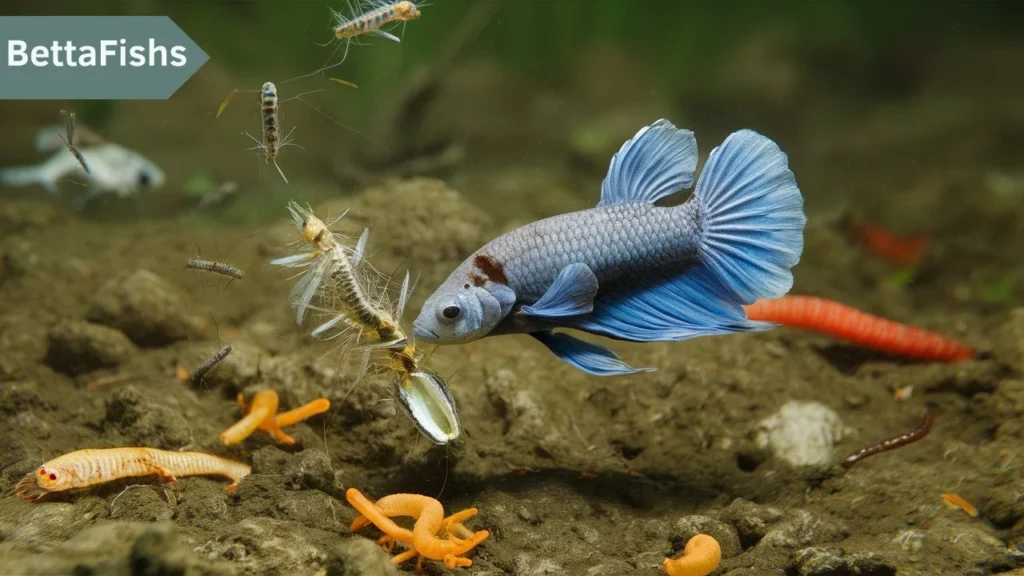
Conclusion
Understanding what Betta fish eat in the wild is essential for providing them with the best care in captivity. Their natural diet is diverse and rich in protein, supporting their growth, health, and vibrant colors. While replicating this diet in captivity can be challenging, incorporating a variety of high-quality foods can help mimic their wild diet and promote their overall well-being.
FAQs
What is the primary diet of Betta fish in the wild?
Betta fish primarily eat insects, larvae, zooplankton, and small invertebrates in the wild.
Can I feed my Betta fish insects like they eat in the wild?
Yes, you can feed your Betta fish live or frozen insects like bloodworms or brine shrimp to mimic their natural diet.
How often should I feed my Betta fish to mimic their wild habits?
Feeding your Betta fish small meals two to three times a day can mimic their natural feeding habits.
Is it possible to create a completely natural diet for Betta fish in captivity?
While it is challenging, you can create a diet that closely resembles their natural diet by offering a variety of live or frozen foods.
What are the risks of not providing a varied diet for Betta fish?
A lack of variety in their diet can lead to nutritional deficiencies, poor health, and a decrease in their vibrant colors.


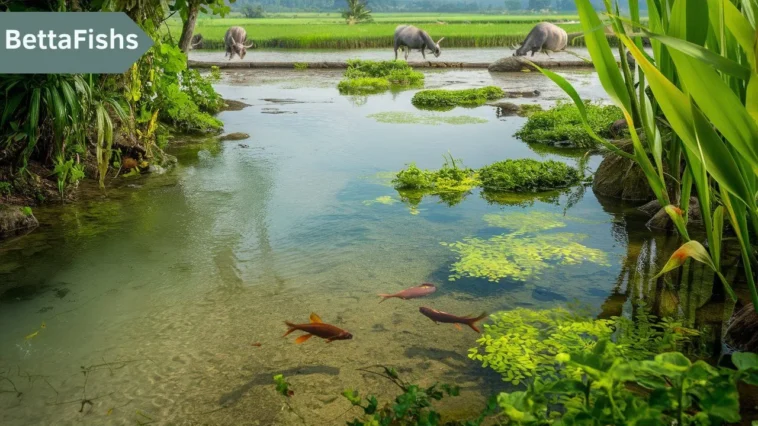
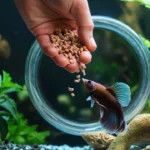
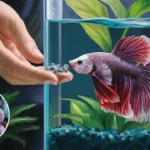
One Comment
Leave a ReplyOne Ping
Pingback:How Often Do Betta Fish Eat?